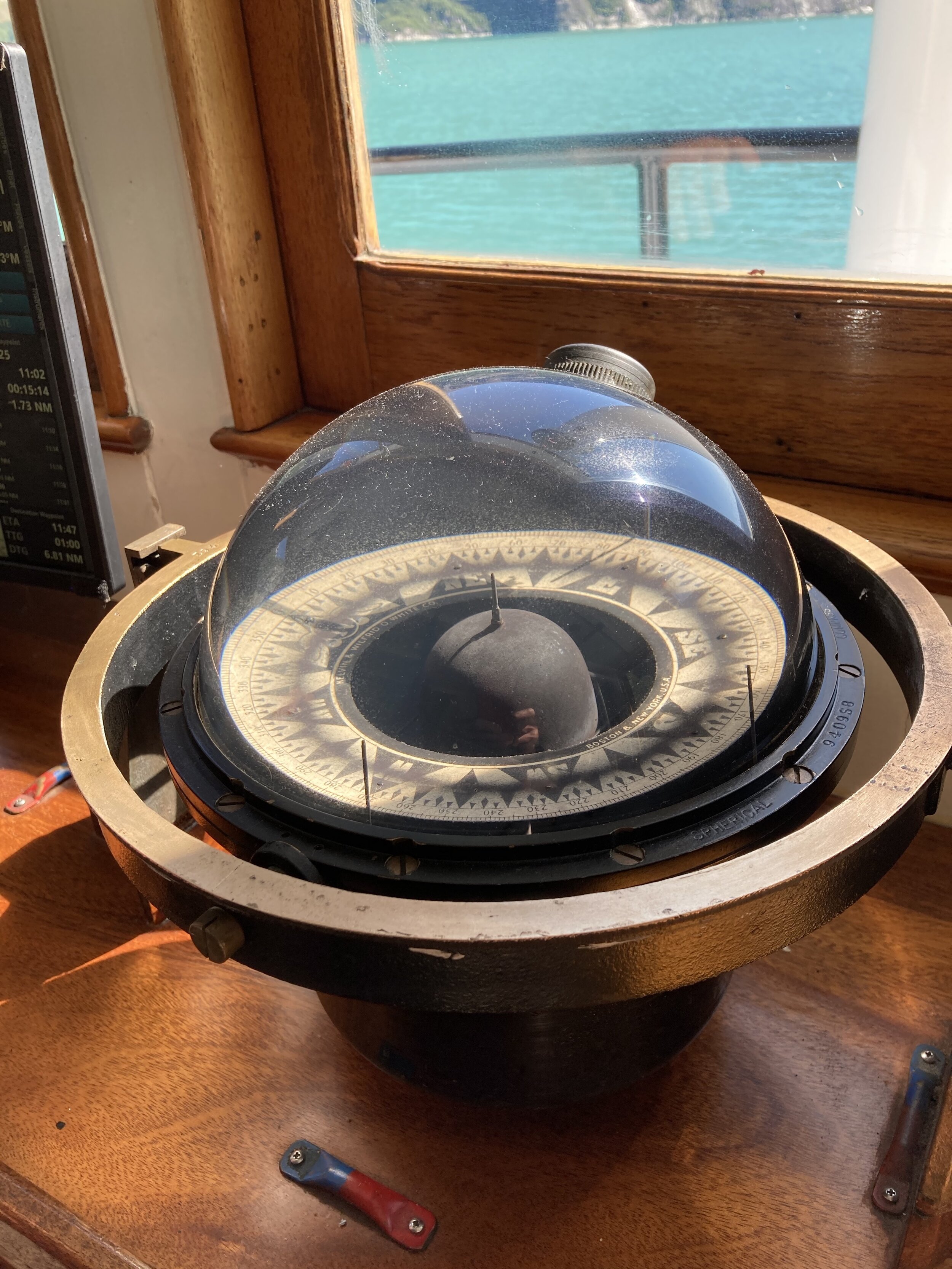 Almost 100-year-old ship’s compass.
Almost 100-year-old ship’s compass.
I suppose it started in March, on the second day of Alex’s scheduled four-week-stay in Paris during the standard spring hiatus from work. The novel corona virus (COVID-19) was spreading rapidly, without reason or logic. Italy’s population was at high risk, especially in the north with their concentrated elderly population. France ordered foreigners to leave, quickly, as the borders were closing, particularly to Americans. My son scrambled for a flight back to Los Angeles, not knowing otherwise when he might be able to return. He said good-bye to Sami as their plans evaporated, the uncertainty of when they’d see each other again looming large. He arrived back in Los Angeles to self-quarantine for fourteen days, during which time the state’s stay-at-home order went into effect. By the end of his hiatus, the television show for which he was a producer decided to finish the season remotely. Friends hunkered down, he huddled in his small apartment, he started thinking—again—about options.
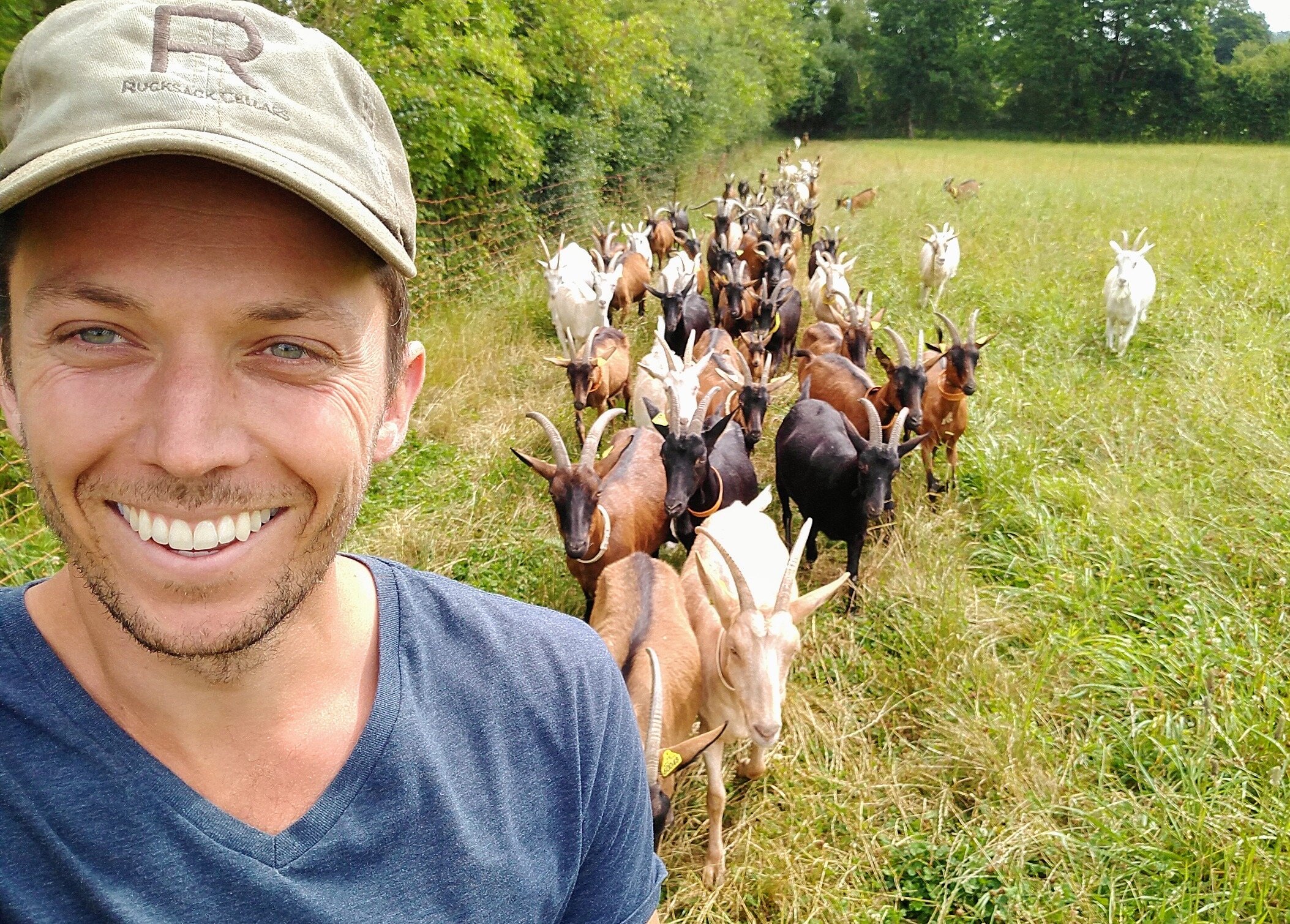 Alex as “wwoofer” at goat farm in France, summer, 2018.
Alex as “wwoofer” at goat farm in France, summer, 2018.
Maybe this story actually began two years ago, when our younger son spent three weeks at a French language and cooking school (where, coincidentally, he met Sami, a Columbian studying in France preparatory to her master’s degree in fashion business). Back home, he engaged twice-weekly tutors, studied for and successfully passed a series of language (Spanish and French) tests, banking on some flexibility in his career by becoming trilingual. He began thinking about graduate courses in France, maybe international business or sustainable tourism (a complement to his nine weeks in Rwanda two summers ago) or some writing curriculum, his first love. This became back-drop as the solitary time this spring and the continuing pandemic hastened his considerations: should he take a break from his career and move to Paris, study, free-lance, be with Sami on a sustained basis? We talked and talked and talked some more. I could feel his frustration with his own uncertainty, with the world’s narrowing, with choices becoming more limited, at least in the near term. He learned that the fall season for his television show would be remote. Could he create excitement for another ten months of remote, at-home work? Or could he make the jump into the abyss, the unknown, yet the potential for a huge pivot in his life? He’d been at this juncture before but this time the opportunity had advantages with the world in chaos and really nothing to lose.
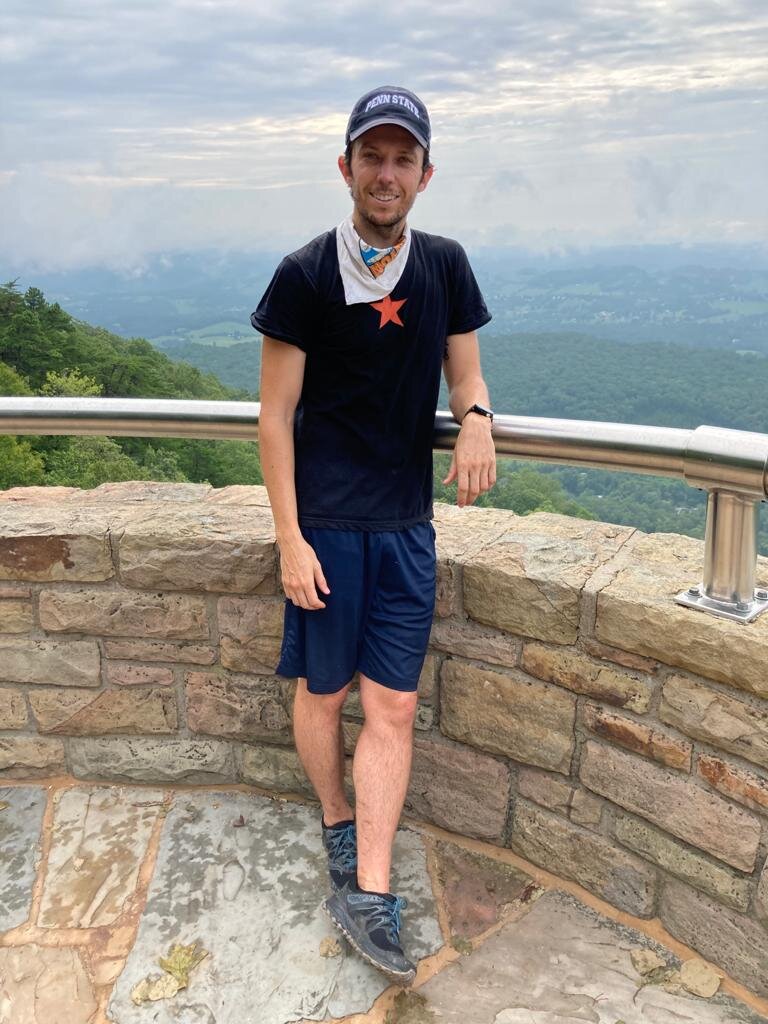
Hiking in Kentucky, waiting for test results (and also completing visiting all 50 states!).
Our small family was already making significant moves: Christopher, Kate and the grandkids are spending the year in Durham, North Carolina where Christopher is a fellow at the National Humanities Center. Doug and I decided to move to a milder climate and to be closer to them (Asheville, NC). If Alex were in France, we’d be closer to him, too. And once the borders open, flying there will be easier than from Colorado. So we couldn’t argue with him making the change; in fact, we agreed that this time of uncertainly, a job that no longer held his interest, and the ability to get to France as a student, boded well for launching him in another direction.
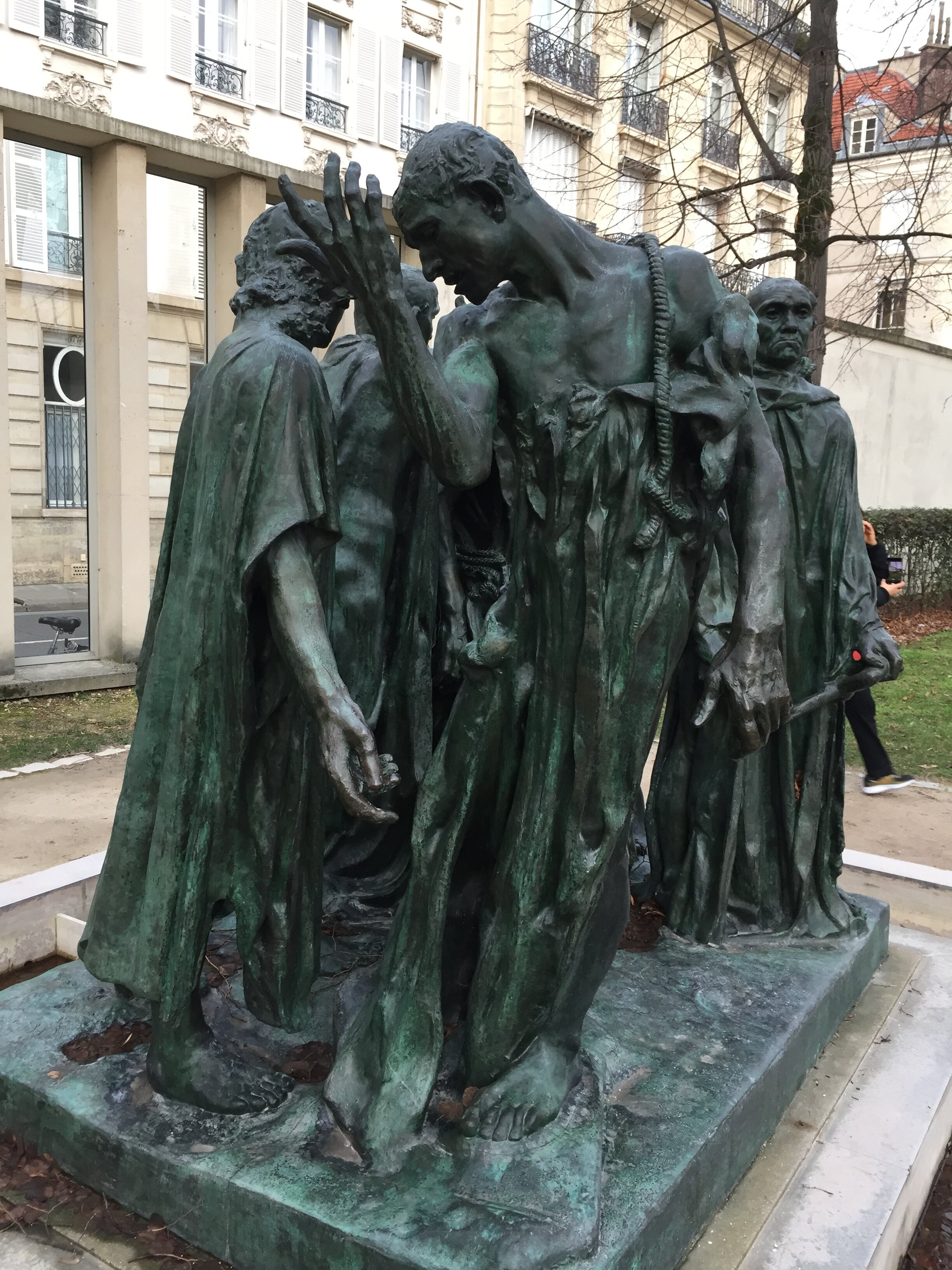
The execution of his plan was not easy. He was accepted at several programs, finally choosing the Master’s Program in Sustainable Tourism Management at Sorbonne University in Paris. He found an apartment for the first three months (both requisites for getting a 12-month student visa). He started the visa process with the French Embassy, which requires (still) an in-person meeting. The Los Angeles office closed, the San Francisco office closed, finally he made an appointment for Washington, DC, which was requiring 14-day quarantines UNLESS one came from a few states not on their prohibited list (which was changing every two weeks). Alex quickly squashed his scenic drive cross-country itinerary (his plan was to leave his extra clothes, books, and miscellaneous stuff with us here in Asheville) and re-routed to Pennsylvania, not yet on DC’s most-quarantine-before-visiting-list. After almost straight-through 38-hour driving, he arrived in State College to quarantine for two weeks with Christopher and family.
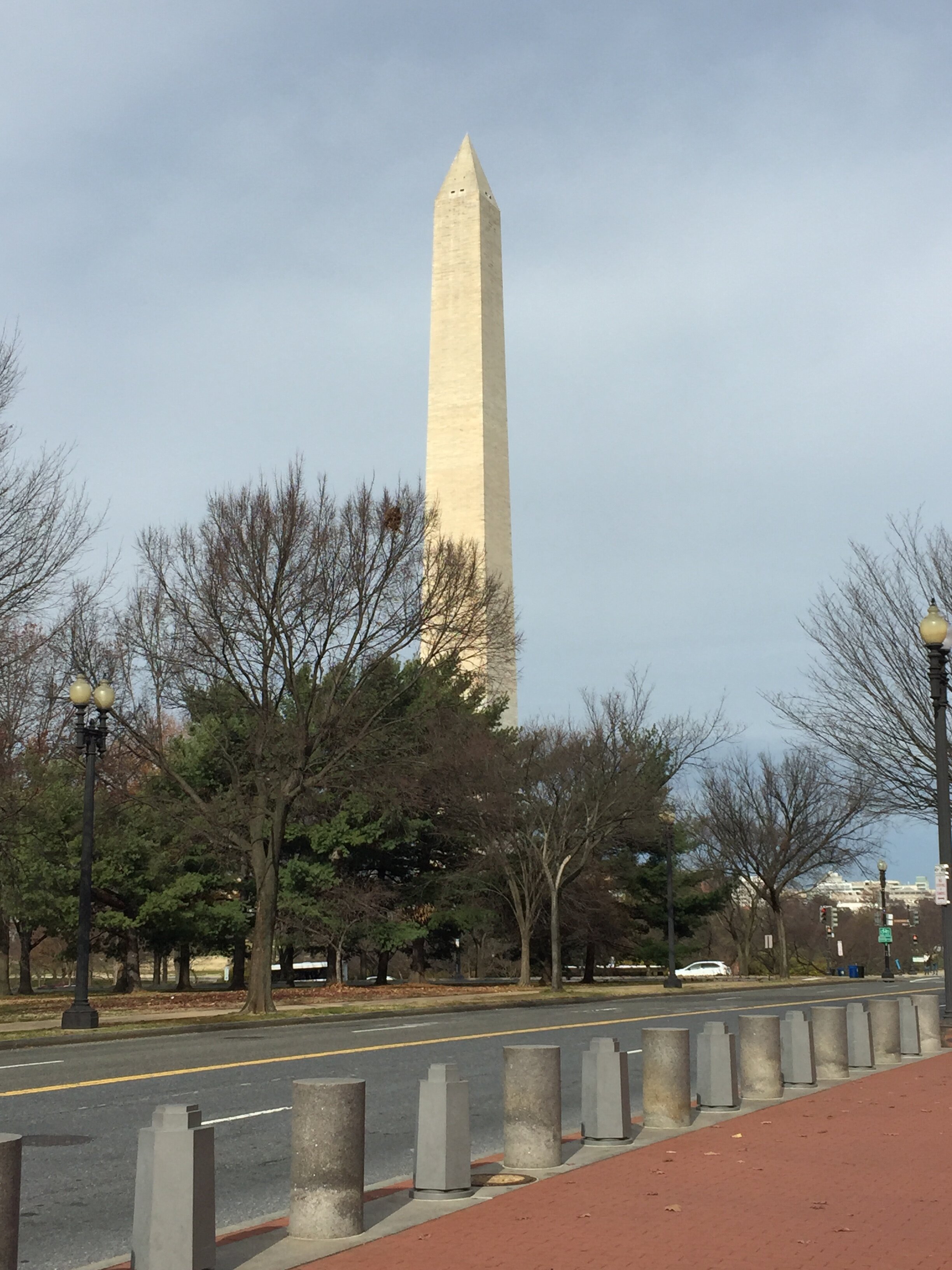
Then, to DC and an appointment with the consulate, and more waiting—up to three weeks before the visa, if approved, would be issued. He drove to Asheville, all his possessions packed tightly in his old Honda CRV. We greeted him with open arms, of course, but also understood his frustration at a broken process, at best. No certainty, plans changing daily, sometimes hourly, no assurance he’d be able to get to Paris in time for his mid-September classes: Americans entering France had to have a specific reason (and a student visa worked) plus a negative COVID-19 test within 72 hours of departure. He couldn’t make flight plans to Paris until he knew he’d have timely negative test results, which of course significantly increased the cost of the flight because he would have to purchase them at most a day in advance, but a cost we were willing to help him bear.
The illogical nightmare of the U.S.’s lack of process commenced. Alex received his French visa within 10 days (more than a week earlier than he’d be told) so made an appointment for a rapid response COVID-19 test, figuring he’d take the test and know within 45 minutes whether he was negative, and then would have several days to fly to Paris. However, when he arrived at the testing facility, the nurse informed him that the rapid tests did not involve PCR (polymerase chain reaction), required for France entry tests. So, he switched to the standard test, had his nose swabbed (or more accurately, irrigated with a sharp plastic stick) on Monday afternoon. As we learned more about the times for flights to France (in the evening) and the likelihood of getting results within 72 hours of test taking, we realized that, in fact, he had about 50-55 hours from taking a test to getting results that would be valid for on-boarding.
Although North Carolina states the “average” test results are two to three days, this wouldn’t help him unless he was very fortunate. We discussed tactical things to do, another test in the hope that one or the other would be processed in time for a flight? He registered for another test for Wednesday. After pleading with the nurse (who was so kind, as they all were, but they have no control over lab diagnostic testing) about the time requirements, she mentioned a little known test with results typically within 24-36 hours. The crunch: he had to be at the draw station in 15 minutes before the tests were sent to the lab. He rushed to the facility, had another awful nose swab, then returned to our place. More thinking and researching found a facility in Atlanta that almost guaranteed results with 36-48 hours. Atlanta is a three-hour drive BUT if either the little known test or the Atlanta test results came back within the discussed times, he would be able to fly to Paris either Friday or Saturday night. So a quick drive to Atlanta for the third test in three days.
Alex has handled the past few months with aplomb. This week, though, the promise of a simple test with clear results to enable his flight to Paris almost broke him. He was working on some new free-lance projects; he was updating Sami daily with his potential flight arrival; he was doing everything he was supposed to do to be able to leave our country. France only requires visitors from three countries (including the U.S. and UAE) to have negative COVID results with 72 hours of flight departure based on the assumption that these countries can comply with this requirement. In fact, without a significant amount of research, calling multiple draw facilities, questioning, being nimble, advocating for himself, taking three tests (at a cost of almost $200 each) within three days, the system fails. The U.S., at least in our limited experience, does not have the ability to enable one easily to comply with this requirement. Alex had some flexibility in his plans; what of those who do need easy access to tests and timely test results, for work, for childcare, for possible exposure to others, for medical treatment? What of those who do not have the patience or resources to keep trying, to drive three hours for a test, to willingly submit to a very uncomfortable procedure three times? Too many holes that other countries have been able to fill.
Alex’s Monday test arrived on Thursday (too late for his purposes) with negative results. A good sign, at least. The Wednesday little known test arrived showing negative results on Thursday (but it didn’t state “PCR” on the test results page). Alex had back-up documentation to prove the test was equivalent to the standard PCR required, but there was no assurance that the airlines would agree. On the hope that this test would be sufficient, he made reservations to fly from Charlotte, NC to Newark to Paris for Friday. He and Doug drove to Atlanta early Friday morning. On the way, he received the final test results from Atlanta: negative with no concern about PCR requirements. At Charlotte-Douglas International Airport, his point of departure, he was required to show the negative results, using the third test without any issue. He’s on his way! Final stop, Charles de Gaulle international airport early Saturday morning.

I am proud of our son for his perseverance and grace under pressure. I am excited for his year ahead. I will miss him immensely, not knowing when France will open for us ordinary people to visit. I regret that his final week in the U.S., at least for now, was so tough and disheartening.
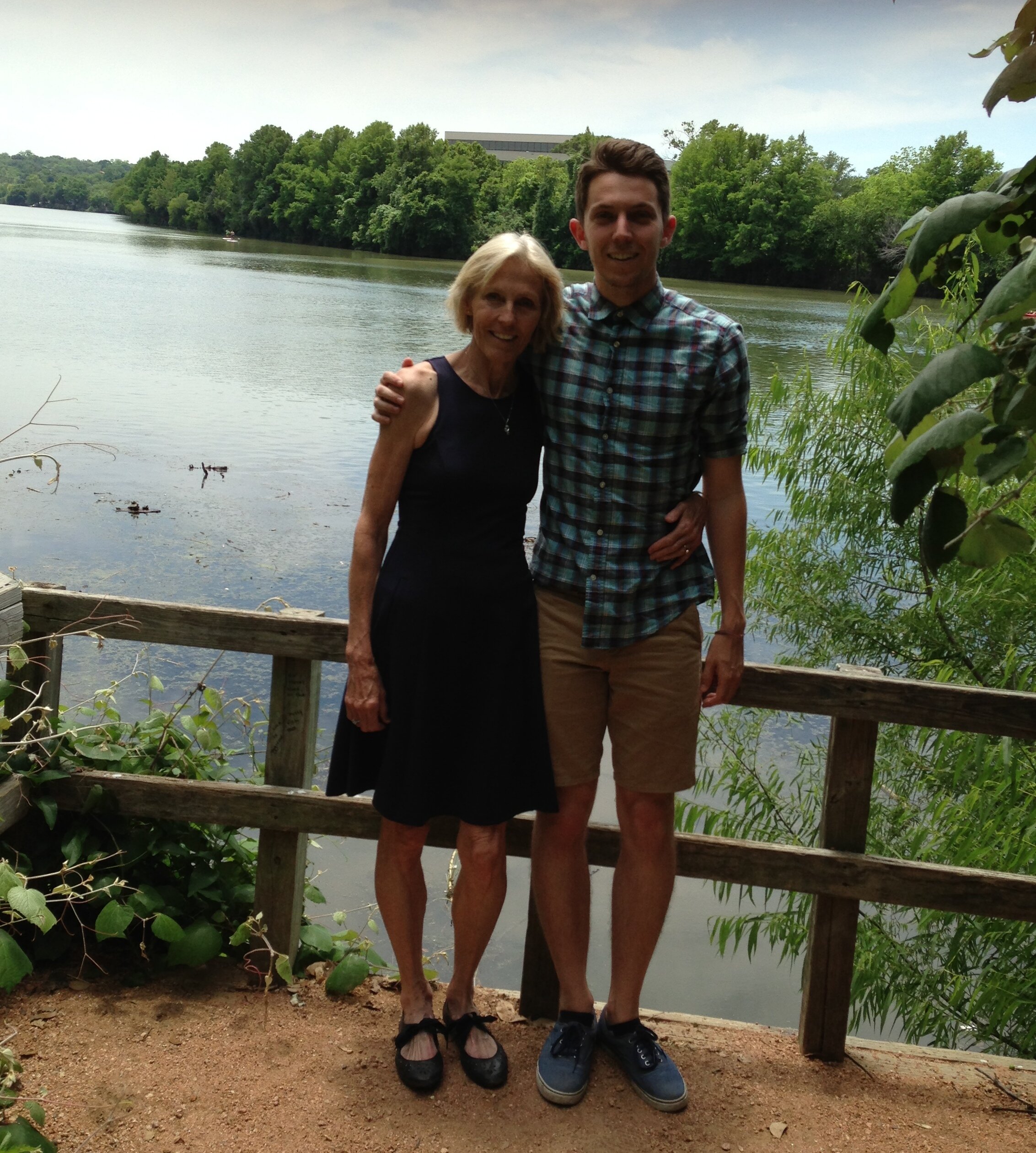 A surprise Mother’s Day visit, Austin, TX 2013.
A surprise Mother’s Day visit, Austin, TX 2013.
Such a interesting article. Hope things go well for him in France.
Quite a challenge for him to leave our country and make it to
France.
Grandma J